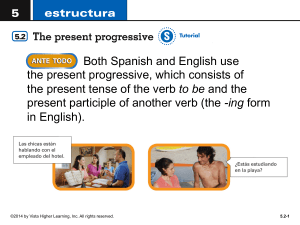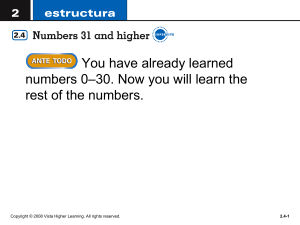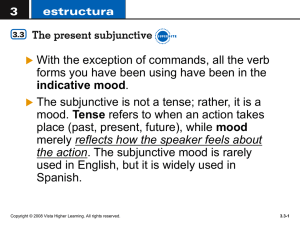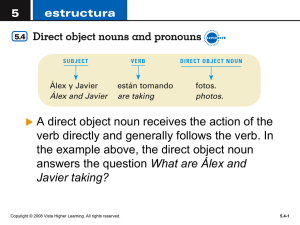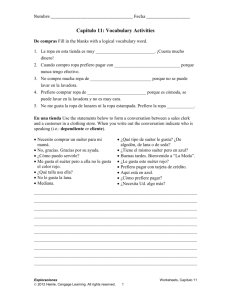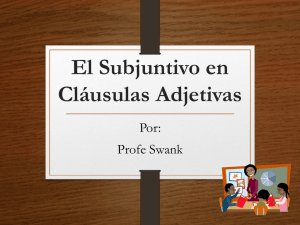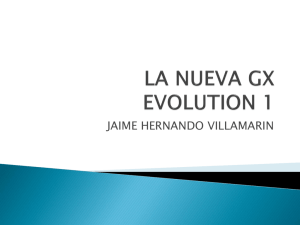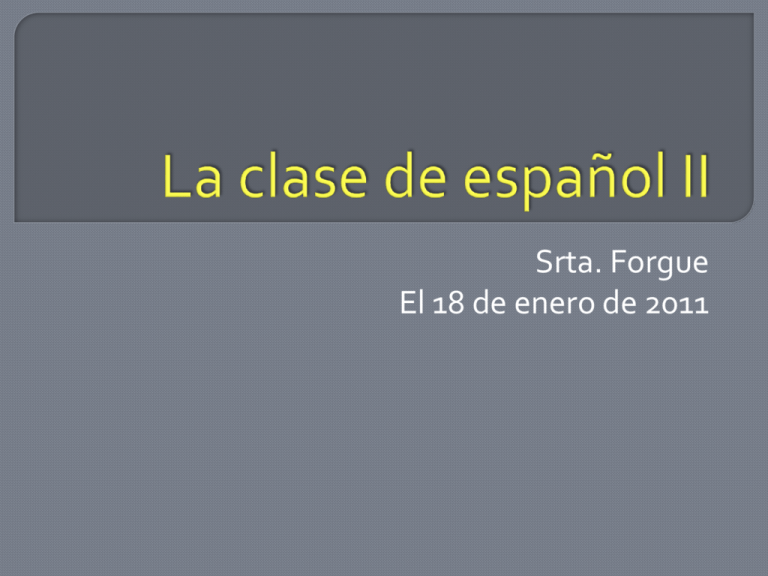
Srta. Forgue
El 18 de enero de 2011
Identificar los dibujos
sacar la basura
poner la mesa
hacer la cama
Terminar la lección del subjuntivo
• Repasar formas del subjuntivo y los verbos de
voluntad e influencia
Trabajar en grupos en la hoja de trabajo 3.4
• Presentar las secciones a la clase para una nota
A tiempo
Ropa
Cuaderno
Libro
Bolígrafo
La tarea de anoche fue:
Cuaderno de práctica
With the exception of commands, all the verb
forms you have been using have been in the indicative
mood. The indicative is used to state facts and to express
actions or states that the speaker considers to be real and
definite. In contrast, the subjunctive mood expresses the
speaker’s attitudes toward events, as well as actions or
states the speaker views as uncertain or hypothetical.
Copyright © 2008 Vista Higher Learning. All rights reserved.
3.3-5
Copyright © 2008 Vista Higher Learning. All rights reserved.
3.3-6
The present subjunctive is formed very much
like usted and ustedes and negative tú
commands. From the yo form of the present
indicative, drop the -o ending, and replace it
with the subjunctive endings.
Copyright © 2008 Vista Higher Learning. All rights reserved.
3.3-7
The present subjunctive endings are:
Copyright © 2008 Vista Higher Learning. All rights reserved.
3.3-8
Verbs with irregular yo forms show the same
irregularity in all forms of the present subjunctive.
Copyright © 2008 Vista Higher Learning. All rights reserved.
3.3-9
To maintain the -c, -g, and -z sounds, verbs
ending in -car, -gar, and -zar have a spelling
change in all forms of the present subjunctive.
Copyright © 2008 Vista Higher Learning. All rights reserved.
3.3-10
Present subjunctive of stem-changing verbs
-Ar and -er stem-changing verbs have the
same stem changes in the subjunctive as they
do in the present indicative.
Copyright © 2008 Vista Higher Learning. All rights reserved.
3.3-11
-Ir stem-changing verbs have the same stem
changes in the subjunctive as they do in the
present indicative, but in addition, the
nosotros/as and vosotros/as forms undergo a
stem change. The unstressed e changes to i,
while the unstressed o changes to u.
Copyright © 2008 Vista Higher Learning. All rights reserved.
3.3-12
Irregular verbs in the present subjunctive
These five verbs are irregular in the present
subjunctive.
Copyright © 2008 Vista Higher Learning. All rights reserved.
3.3-13
¡Atención! The subjunctive form of hay
(there is, there are) is also irregular: haya.
Copyright © 2008 Vista Higher Learning. All rights reserved.
3.3-14
General uses of the subjunctive
The subjunctive is mainly used to express:
1) will and influence, 2) emotion, 3) doubt,
disbelief, and denial, and 4) indefiniteness and
nonexistence.
Copyright © 2008 Vista Higher Learning. All rights reserved.
3.3-15
The subjunctive is most often used in
sentences that consist of a main clause and a
subordinate clause. The main clause contains a
verb or expression that triggers the use of the
subjunctive. The conjunction que connects the
subordinate clause to the main clause.
Copyright © 2008 Vista Higher Learning. All rights reserved.
3.3-16
These impersonal expressions are always
followed by clauses in the subjunctive:
Copyright © 2008 Vista Higher Learning. All rights reserved.
3.3-17
Verbs of will and influence are often used
when someone wants to affect the actions or
behavior of other people.
¡Atención! In English, constructions using the
infinitive, such as I want you to go, are often used
with verbs or expressions of will or influence. This is
not the case in Spanish, where the subjunctive would
be used in a subordinate clause.
Copyright © 2008 Vista Higher Learning. All rights reserved.
3.4-18
Here is a list of widely used verbs of will
and influence.
Copyright © 2008 Vista Higher Learning. All rights reserved.
3.4-19
Some impersonal expressions, such as
es necesario que, es importante que,
es mejor que, and es urgente que, are
considered expressions of will or influence.
Copyright © 2008 Vista Higher Learning. All rights reserved.
3.4-20
When the main clause contains an expression
of will or influence, the subjunctive is required
in the subordinate clause, provided that the
two clauses have different subjects.
Copyright © 2008 Vista Higher Learning. All rights reserved.
3.4-21
Copyright © 2008 Vista Higher Learning. All rights reserved.
3.4-22
Indirect object pronouns are often used with
the verbs aconsejar, importar, mandar,
pedir, prohibir, recomendar, rogar,
and sugerir.
Copyright © 2008 Vista Higher Learning. All rights reserved.
3.4-23
Note that all the forms of prohibir in the
present tense carry a written accent, except
for the nosotros/as form: prohíbo, prohíbes,
prohíbe, prohibimos, prohibís, prohíben.
Copyright © 2008 Vista Higher Learning. All rights reserved.
3.4-24
The infinitive is used with words or
expressions of will and influence, if there is no
change of subject in the sentence.
Copyright © 2008 Vista Higher Learning. All rights reserved.
3.4-25
Completa cada oración con la forma correcta del verbo
entre paréntesis.
vayas (ir) con ella al supermercado.
1. Te sugiero que ______
2. Él necesita que yo le ______ (prestar) dinero.
3. No queremos que tú ______ (hacer) nada especial para nosotros.
4. Mis papás quieren que yo ______ (limpiar) mi cuarto.
5. Nos piden que la ______ (ayudar) a preparar la comida.
6. Quieren que tú ______ (sacar) la basura todos los días.
7. Quiero ______ (descansar) esta noche.
Copyright © 2008 Vista Higher
Learning. All rights reserved.
3.4-26
Completa cada oración con la forma correcta del verbo
entre paréntesis.
8. Es importante que ustedes _____ (limpiar) los estantes.
9. Su tía les manda que _____ (poner) la mesa.
10. Te aconsejo que no _____ (salir) con él.
11. Mi tío insiste en que mi prima _____ (hacer) la cama.
12. Prefiero _____ (ir) al cine.
13. Es necesario _____ (estudiar).
14. Recomiendo que ustedes _____ (pasar) la aspiradora.
Copyright © 2008 Vista Higher
Learning. All rights reserved.
3.4-27
Empezar repaso para el examen de Lección 3
(viernes el 21 de enero)
• La vivienda: vocabulario
• Lo que, que, quien
• Mandatos formales
• El subjuntivo
• El subjuntivo con verbos de voluntad e influencia

